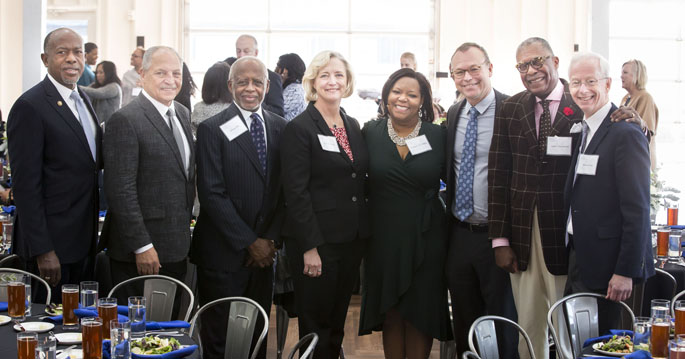
In 1999 Meharry Medical College and Vanderbilt University Medical Center announced the establishment of a formal alliance to enhance the educational, scientific and clinical programs at and between both institutions.
Through a signed “Memorandum of Understanding,” the Meharry-Vanderbilt Alliance established a working relationship for undergraduate and graduate medical education, research and training, the utilization of shared research, teaching, patient care and library facilities, and enhanced interaction of students and faculty at both schools.
Twenty years later, the Alliance is still going strong and recently celebrated its success with an anniversary celebration on Nov. 13.
“It is fantastic to see so many of you here today. It is really my honor to lead the Meharry-Vanderbilt Alliance and I consider it a privilege to be in this position and to celebrate this really important milestone after 20 years,” said Consuelo Wilkins, MD, MSCI, executive director of the Alliance since 2012, as she welcomed Meharry and Vanderbilt leaders, special guests and community partners.
George Hill, PhD, Levi Watkins Jr. MD Distinguished Professor Emeritus, spoke of the importance of the Alliance.
“The Alliance brought us together to support a common purpose. It was very clear from the beginning that the goal was to identify ways to have an impact on the two institutions that would be beneficial to the training and research at both academic medical centers and, most importantly, identify ways to address racial and ethnic health disparities to achieve health equity,” Hill said.
“The Alliance helped accelerate the partnership between our two distinguished institutions and stimulated other institutions to do the same. The interest and commitment of our faculty ensured its success. The Alliance accelerated much research collaboration…and created an environment where talented students, faculty and staff from both institutions chose to come and work and collaborate on efforts to address health disparities and achieve health equity. This continues today.”
Over the past 20 years, the Alliance has had many accomplishments, including establishing joint and developing cooperative programs that facilitated the enhancement of medical education and amassed nearly $318 million in joint research funding and training grants, including the health disparities focus of the Southern Community Cohort Study, the CFAR (Center for AIDS Research) grant, the U54 Cancer Partnership, and the Centers for Disease Control and Prevention’s REACH initiative (Racial and Ethnic Approaches to Community Health).
Wilkins reflected on her tenure with the Alliance and all that it has accomplished over the past two decades.
“Part of the reason I was recruited was to increase the footprint of community engagement and community-engaged research. We’ve developed a number of initiatives in that area and it really changes the Alliance from being a cross-institutional program to having more of a triangle: how can Vanderbilt and Meharry work together but also work with the community around health issues, research and education?” Wilkins said. “We’ve been very successful in establishing some programs, but more importantly strengthening relationships we have with community organizations, and that’s been to the benefit of both institutions.”
One example of that work is with the Safety Net Consortium of Middle Tennessee. The Alliance has been the anchor of that organization, which includes all the community health centers in Nashville and the faith-based health centers and programs that are serving populations that have limited access to care.
“That’s probably what I am most proud of … expanding in that space, working with our community,” said Wilkins, Vice President for Health Equity, VUMC, and associate dean for Health Equity, VUSM.
During the 20th anniversary event, James E.K. Hildreth, MD, PhD, Meharry Medical College President and CEO, and Jeff Balser, MD, PhD, President and CEO of VUMC and Dean of the School of Medicine, presented Partnership Awards to the following:
- Meharry-Vanderbilt-TSU Cancer Partnership — Recipients: Samuel Adunyah, PhD, Meharry Medical College, and Harold Moses, MD, Vanderbilt-Ingram Cancer Center
- TN Center for AIDS Research (CFAR) Partnership — Recipients: CV Dash, PhD, Meharry Medical College, and David Haas, MD, VUMC
- Meharry-Vanderbilt Community Engaged Research Core (CERC) — Recipients: Stephania Miller-Hughes, PhD, Meharry Medical College, and Yvonne Joosten, MPH, Vanderbilt Institute for Medicine and Public Health
- Interprofessional Education (IPE) Partnership — Recipients: Regina Offodile, MD, Meharry Medical College, and Mavis Schorn, PhD, Vanderbilt University School of Nursing
- Safety Net Consortium of Middle Tennessee — Recipient: Carol Westlake, Safety Net Consortium of Middle Tennessee.












